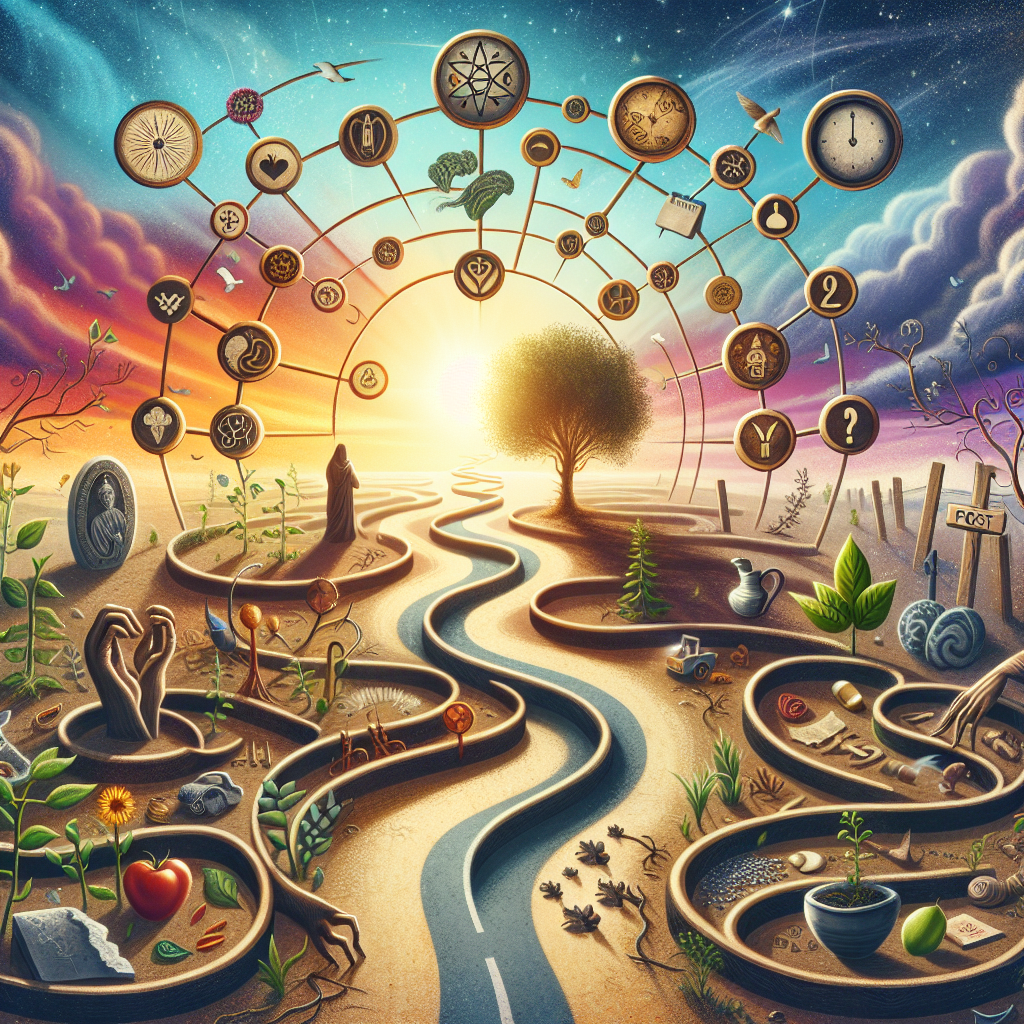Karma is an age-old concept that has intrigued and inspired people across cultures and religions. Often interpreted as “what goes around, comes around,” this principle suggests that our actions, whether good or bad, have consequences that extend beyond our immediate experiences. Understanding karma can provide valuable insights into how the choices we make today impact not just our present, but our future lives as well.
The Concept of Karma
Originating from ancient Indian philosophies, karma is a Sanskrit word that translates to “action.” In Hinduism, Buddhism, and Jainism, karma plays a crucial role in the cycle of birth, death, and rebirth known as samsara. The belief is that our actions create a moral imprint on our souls, which influences our future experiences and reincarnations.
However, while karma is often associated with the idea of fate or predetermined destiny, it’s important to note that it emphasizes personal responsibility. The notion of karma does not imply that we are powerless victims of our circumstances; instead, it highlights how our choices actively shape our experiences and future.
Types of Karma
Karma can be broadly categorized into three types:
-
Sanchita Karma: This is the accumulated karma from all our past actions—the sum of our deeds. It represents the entirety of our accumulated experiences across lifetimes.
-
Prarabdha Karma: This refers to the portion of sanchita karma that is currently active and manifests in our present life. It encompasses the events and situations we are experiencing now as a result of previous actions.
- Kriyamana (or Agami) Karma: This is the karma we create in the present moment through our current actions and intentions. It can be viewed as the karma that is yet to play out, shaping our future experiences based on what we do now.
Understanding these three types of karma provides clarity on how our actions are interconnected and emphasizes that our present choices are powerful determinants of our future.
How Our Actions Shape Our Future Lives
Karma operates on the principle of cause and effect. Every action (cause) generates a reaction (effect) that can manifest immediately or may take time to unfold. This relationship underscores the importance of conscious living—making deliberate choices that align with positive intentions.
1. Intentions Matter
In the context of karma, it is not only the action itself that counts but also the intention behind it. Performing a good deed with a genuine desire to help others will carry a different karmic charge than performing the same deed for selfish reasons or recognition. The purity of our intentions shapes the quality of the karma we create.
2. Mindfulness of Actions
Being aware of our thoughts, words, and actions can significantly alter our karma. Mindfulness encourages us to reflect on our motives and the potential consequences of our actions. For instance, choosing to respond with kindness rather than anger in a difficult situation can foster positive karmic seeds that may blossom in our lives later on.
3. Learning from Past Actions
Karma is also about learning and growth. The challenges and hardships we face can be opportunities for development. If we acknowledge the lessons embedded within our experiences and actively seek to improve our future actions, we begin to cultivate a more positive karmic blueprint.
4. Interconnectedness of Actions
Our lives are interconnected in ways we may not always perceive. The impact of our actions extends beyond ourselves to affect family, friends, communities, and the world at large. Acts of generosity, compassion, and love create ripples that influence the lives of others, establishing a network of karma that can reverberate back to us.
5. Sowing and Reaping
The agricultural metaphor of “sowing and reaping” aptly describes the karmic process. Just as a farmer plants seeds and nurtures them, we too “plant” actions through our behavior. The fruits of our labor—whether joy, suffering, success, or failure—are the results of the actions we cultivate.
Misconceptions About Karma
Despite its widespread popularity, there are several misconceptions about karma that deserve clarification:
-
Karma is Not Punishment: Many people view karma as a form of punishment for wrongdoing. In reality, karma serves as a natural feedback mechanism that helps us learn and grow from our experiences.
-
Karma is Not Instantaneous: The idea that karma delivers immediate consequences is a common misconception. While some actions may produce swift results, others may take years or even lifetimes to manifest.
- Not All Suffering is Karma: Life comprises various experiences, and suffering can stem from numerous sources, including random chance, natural disasters, and personal relationships. It’s important to avoid oversimplifying complex situations by attributing them solely to past karma.
Practical Steps to Create Positive Karma
Creating positive karma involves actionable steps in our daily lives. Here are some suggestions:
-
Practice Kindness: Simple acts of kindness—be it offering a smile, a helping hand, or a listening ear—can generate positive karma.
-
Be Grateful: Cultivating gratitude shifts our perspective and fosters a positive mindset, creating a ripple effect of positive energy.
-
Meditate and Reflect: Regular self-reflection and meditation can help clarify intentions, allowing us to act with mindfulness.
-
Engage in Service: Volunteering and helping others can create a sense of community and enhance our karmic balance.
- Forgive and Release Grudges: Holding onto resentment only weighs us down. Practicing forgiveness allows us to free ourselves and pave the way for positive karma.
Conclusion
Karma serves as a profound reminder that we are co-creators of our reality through our actions. By understanding the principles of karma and embracing mindful living, we can shape our present and future in impactful ways. Each choice we make contributes to our karmic tapestry, influencing not only our own lives but also the lives of those around us.
FAQs
Q1: Is karma the same as fate?
A1: No, karma and fate are different. Karma emphasizes personal actions and their consequences, while fate implies a predetermined outcome that cannot be altered.
Q2: Can karma be changed?
A2: Yes, karma can be transformed through conscious actions and intentions. By making positive choices, you can create new karma that influences your future positively.
Q3: How long does it take for karma to manifest?
A3: The timeframe for karmic consequences varies—some actions produce immediate results, while others may take years or even lifetimes to unfold.
Q4: Does good karma erase bad karma?
A4: While good karma can help offset the effects of past negative actions, it does not completely negate them. Each action has its own consequences and lessons to be learned.
Q5: How can I cultivate positive karma in my life?
A5: Engaging in acts of kindness, practicing gratitude, reflecting on your actions, and actively seeking to help others can all contribute to cultivating positive karma.
Sure! What kind of prompt are you looking for? It could be creative writing, a story idea, a question for discussion, or something else entirely. Let me know, and I’ll be happy to help!, #Karma #Actions #Shape #Future #Lives, #Karma #Actions #Shape #Future #Lives, 1736582063, karma-101-how-our-actions-shape-our-future-lives





